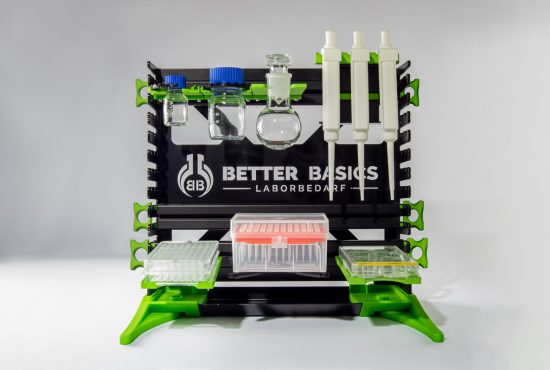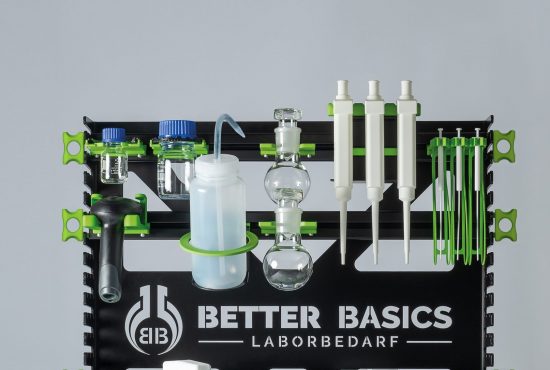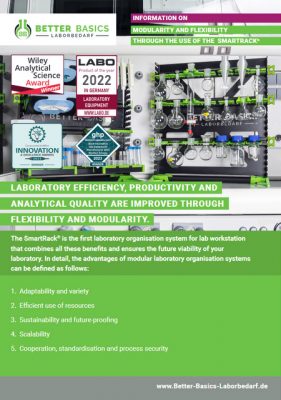THE SMARTRACK®
The SmartRack® in Use – saving space, tidiness, efficiency and aesthetic elegance are combined with state-of-the-art technology- made in Germany.
The SmartRack® and the innovative solutions of the SmartIntegrate product line combine flexibility and modularity in your lab
Laboratory efficiency, productivity and analytical quality are improved through flexibility and modularity.
The main reason for this is the combination of cost savings and standardisation through the use of modular systems. The SmartRack® and the innovative solutions of the SmartIntegrate product line are the first laboratory organisation system for lab workstation that combines all these benefits and ensures the future viability of your laboratory. In detail, the advantages of modular laboratory organisation systems can be defined as follows


1. Adaptability and variety:
Laboratories often need to respond to changing needs. By using modular systems, they can quickly and easily adapt their equipment and resources to carry out different experiments or tests, or to implement new work equipment. This makes it possible to optimise the workflow and increase the productivity of the laboratory, as the required tools and laboratory equipment can be combined in a flexible way and are always available where they are needed – directly at the workstation.
2. Efficient use of resources:
Modularity allows for more efficient use of laboratory resources. Instead of having to purchase specific equipment for each analysis or workflow, individual modules can be used for different purposes in a space-saving manner. This reduces the need for redundant (laboratory) equipment and significantly reduces the space required in the laboratory. In addition, defective modules can be quickly replaced or serviced as needed without disrupting the entire workflow.
3. Sustainability and future-proofing:
Modularity is an investment in sustainability and can be seen as an example of environmental awareness, as investing in a solution that can be continuously adapted and expanded saves money in the long term and ensures the usability of a flexible system in the near and distant future. This also reduces the need to implement and train staff on new solutions and systems in the future.
4. Scalability:
The modular design allows laboratories to adapt their capacity in a flexible way. If the demand for certain content or experiments increases, labs can simply add modules to increase their working capacity. This enables cost-effective scaling of lab capacity according to demand and is in line with the sustainable sharing economy approach.
5. Cooperation, standardisation and process security:
By using modular systems, laboratories can more easily collaborate and share knowledge. As themodules of the SmartRack® and the innovative solutions of the SmartIntegrate product line are developed to standardised interfaces and standards, they can be used across departments or even laboratory sites. In addition, workflows can be standardised through the use of our products, which help to avoid errors and increase the quality of the process.
All in all, flexibility and modularity bring many benefits to the laboratory. They enable efficient adaptation to changing requirements, support a wide variety of experiments, optimise the use of resources, are sustainable, facilitate scalability, promote standardisation and increase the reliability of processes. Laboratories can increase productivity and comply with standards such as DIN ISO 9001, DIN ISO 17025, DIN EN 13150-2001 EN, DIN EN 14056-2003 EN and TRGS 526 by using a modular system such as SmartRack® or one of the innovative solutions of the SmartIntegrate product line.
Further information
You can download our product catalog as a PDF file from the downloads section of our website.
If you are interested in our products, please use the inquiry form in the downloads section.

